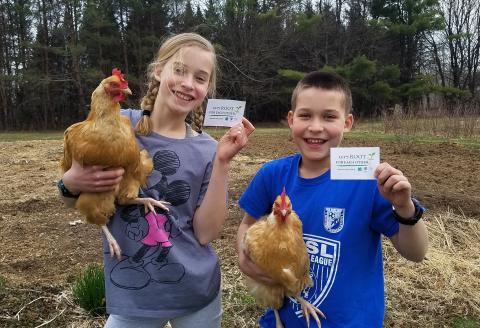UNH Extension Helps Families Manage Anxiety, Build Resilience During Pandemic

Some 4-H members proudly display summer squash. Others dutifully watch over seeds just beginning to sprout. Children pose with egg cartons packed with soil, stand next to raised beds or hold up chickens.
These scenes are posted as photo comments on the NH 4-H Community Facebook page, which was created to foster connection during times of social distancing. Extension’s 4-H staff and volunteers have recognized the importance of maintaining communication and outreach during these challenging times. They have worked diligently to keep spirits high and ensure that 4-H learning can continue.
The campaign “Let’s Root For Each Other,” spearheaded by 4-H program manager Laurie Field in Merrimack County, encourages 4-H families to share their home gardening experiences. Some counties even mailed seed packets and growing supplies to assist 4-H’ers in launching their gardens.
Michelle Bersaw, 4-H horticulture field specialist, explains that gardening can yield numerous mental health benefits like increasing attention span and boosting self-esteem. This initiative demonstrates one of the many ways that Extension has continued to cultivate wellbeing through remote learning.

Managing Stress, Processing Grief
In addition to providing educational experiences to advance technical skills, Extension staff help youth and families with social, emotional and mindful learning. This skillset focuses on managing emotions and developing empathy while building positive relationships.
The COVID-19 pandemic disrupted many families’ routines in sudden ways, leading to difficult feelings like disappointment, frustration, anxiety and sadness. School shifted online, sports seasons were curtailed, graduations and other celebrations were scaled down or canceled altogether.
Creating a Sense of Belonging
How do you run a virtual meeting that makes participants feel seen, heard and valued? What protocols should you establish? With distance learning comes a need for understanding best practices for virtual communication with children and young adults.
Extension is using tools like webinars, social media, blogs, newsletters and online training sessions to provide support, share resources and offer guidance to families experiencing these challenging situations.
Building Resiliency
Kendra Lewis, state specialist for youth and family resiliency, emphasizes that Extension’s work focuses on the opportunity for growth. “Resiliency is being able to not only bounce back from trauma, but also thrive,” she says. “It’s about growing and being better prepared for whatever comes next.”
Related Resource(s)
